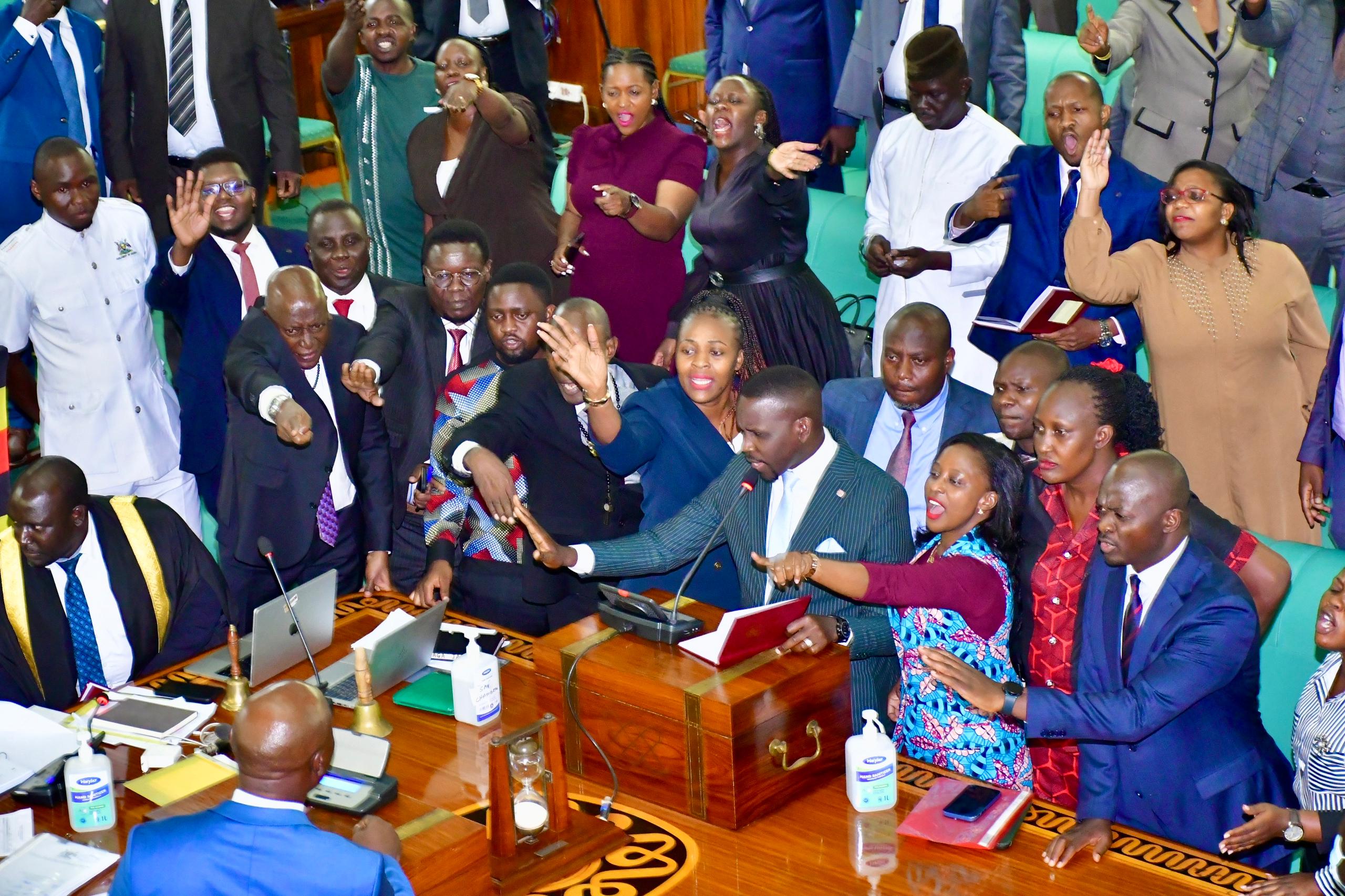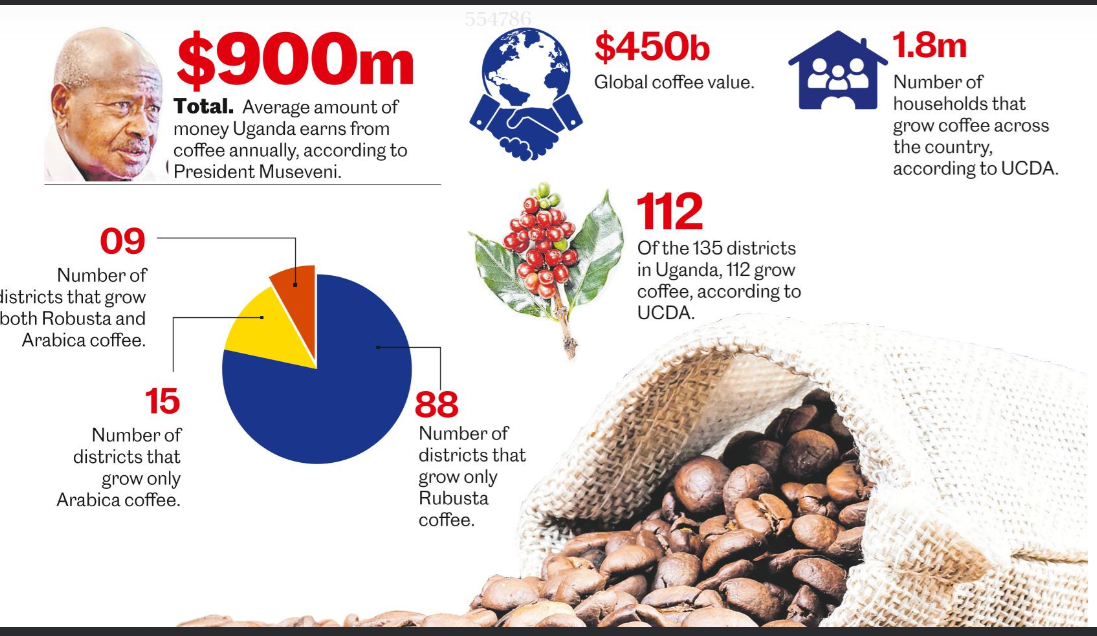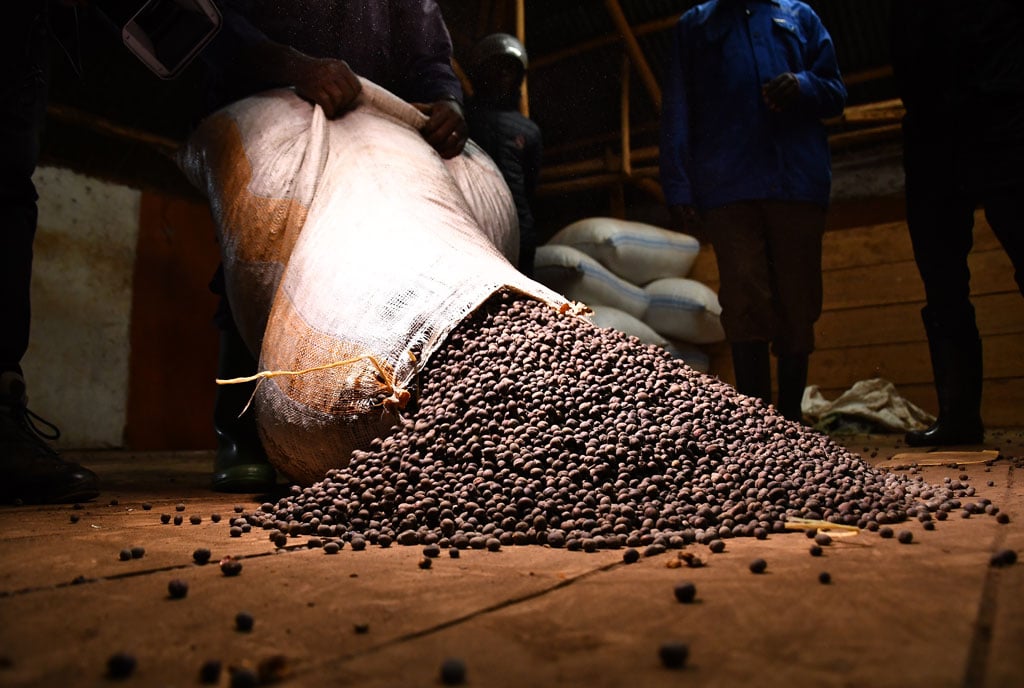
Opposition Members of Parliament led by the Leader of Opposition (LOP), Joel Ssenyonyi put the Speaker, Ms Anita Among, on task during the plenary session at Parliament on October 24, 2024. PHOTO/DAVID LUBOWA
Emotions are running high as Parliament meets today to debate and pass or drop the controversial National Coffee (Amendment) Bill, 2024.
The Bill has stirred mixed emotions among stakeholders in the coffee sector and made headlines for the past few weeks. But today’s debate is expected to end nearly a month of war of words between the backers and critics of the Bill.
More than 300 MPs from the ruling National Resistance Movement (NRM) party, and 110 from the five Opposition parties, and more 80, who are Independent, are expected to jam Parliament for the debate.
The Bill seeks to scrap the Uganda Coffee Development Authority (UCDA) and absorb its functions into the Ministry of Agriculture, Animal Industry and Fisheries (MAAIF).
Mr Bright Rwamirama, the State minister for Agriculture, recently told Parliament that mainstreaming UCDA would address wasteful administration and expenditure and ensure efficient service delivery.
But those opposed to the amendment say MAAIF has no capacity to handle coffee, which is Uganda’s biggest export.
But both camps have vowed to put up a spirited fight to ensure their side wins. Only days ago, a section of MPs vowed to block the Bill on the floor of Parliament, while their counterparts from the ruling National Resistance Movement (NRM) party, led by Mr Hamson Obua, the Government Chief Whip, vowed a more spirited response.
Nonetheless, Mr Chris Obore, the Parliament director of communication and public affairs, yesterday assured this newspaper that the security would ensure the debate proceeds with sanity within the precincts of the August House.
President Museveni heightened the mood of tense expectation during the NRM Parliamentary Caucus meeting at his farm at Kisozi in Gomba District at the weekend.
Mr Museveni reportedly said: “We are going to have a showdown; they are liars and criminals playing with fire. They will not like the counterattack.”
But a section of MPs have described the President’s statement as calculated intimidation.
Mr Joel Ssenyonyi, the Leader of the Opposition in Parliament (LoP), on November 5 told reporters at Parliament that the MPs opposed to the Bill would not be deterred by threats.
“We are going to start from where we stopped. We are determined to defend the economic empowerment of the people of Uganda. There have been many threats, as you entered the Parliament, you saw the whole building cordoned off. We have heard that tomorrow will be worse; they are going to deploy all manner of the military; plain clothes, including inside the building. But that is okay,” he said.
“No one is going to intimidate us because no one wrote to us an invitation and said ‘I would like you to come and sit in this House’. No. The people who voted us in have sent us here and they are happy with the work we are doing,” he said.
“So, if anyone has got ideas to try to intimidate us; because we hear they are planning to arrest some of us; we have been arrested so many times; that isn’t something you can use to threaten some of us. So, we shall be here tomorrow to defend the economic empowerment of the farmers,” Mr Sssenyonyi added.
On October 24, after the dramatic scenes in Parliament chaired by Speaker Anita Among, 159 MPs voted to proceed with the Second Reading of the Coffee Bill, while 77 MPs voted against it.
Mr Museveni upon witnessing the strong reactions from some MPs, coffee stakeholders, including Buganda Kingdom premier Charles Peter Mayiga, penned an October 27 letter to Ugandans justifying why UCDA must go.
He quickly followed this up with two more letters on the same subject before summoning the NRM parliamentary caucus last Friday.
On November 5, the Presidential Press Unit announced the cancellation of Mr Museveni’s planned countrywide assessment tour to evaluate the progress of the Parish Development Model (PDM).
The November 5 press statement said the tour, which should have kicked today with Bukedi Sub-region, had been pushed to November 10.
Mr Faruk Kirunda, the Special Presidential Assistant in charge of Press and Mobilisation, confirmed the development, which he said was aimed at ensuring the MPs first dispose of Coffee Bill debate.
“On this occasion, there happens to be an important parliamentary sitting on Wednesday (today), yet the MPs are part of the PDM tour as mobilisers and stakeholders. They should be free to attend Parliament without missing out on the PDM tour,” he said.
The order paper posted on the Parliament official X-platform on Monday and confirmed by Mr Obore yesterday shows that the National Coffee (Amendment) Bill, 2024, is the fifth item to be handled by the House today.
Parliament Speaker Among adjourned the House sine die on October 24.
Today, Parliament will listen to the Committee of Agriculture and afterwards reconvene as a Committee of the whole House to scrutinise each of the 58 Clauses of the 14-page Bill. It is at this stage that the real tussle over the Bill is expected to ensue.
But Mr Obore assured: “The Parliament administration urges MPs to honour their titles in whatever they do. Parliament is more about organised talking and not chaos. There is more that unites MPs and Ugandans than the divergence of policy positions. It is not the individuals disagreeing but the approaches to issues, so, it is needless to fight.”
But Mr Ssenyonyi said the government was not interested in the people of Uganda prospering, citing recent scenarios with vanilla, cotton, the cooperative societies, which he said the government deliberately ran down.
“So [the] government has made it, as if their policy that Ugandans should not be empowered economically because they will be complicated, they will speak out for themselves and that is why they are fighting coffee now, because coffee has empowered Ugandans. They are making a good living out of it and now, they want to go after it, that is their plan,” he said.
The chairperson of the Buganda Parliamentary Caucus, Mr Muhammad Muwanga Kivumbi had earlier said: “All we are saying is leave UCDA and start that five year transition and after seeing that the ministry is ready to take on the duties of UCDA, you will bring your Bill but now we can’t allow coffee, the poor man’s last hope to go down like that.”
In the earlier proposed Bill presented to Parliament by Mr Rwamirama, a three-year transition period had been proposed to enable the ministry gradually take over UCDA's roles.
But Dr Chris Baryomunsi, the Minister for Information and Communication Technology (ICT), and National Guidance, told the media yesterday that the Cabinet on Monday this week scrapped this proposal.
“Once the Bill is passed by Parliament and signed into law, the Ministry of Agriculture will immediately assume the roles of UCDA," he said.
Ms Nakato Kyabangi, the regional commissioner in charge of all Resident District Commissioners (RDCs) in central region, said the legislators opposed to the Bill should debate with a sober mind and avoid boycotting as they had done previously.
“They should not leave the Bill to be passed without their input because we all know that NRM has numbers and they will pass it. Let all the MPs be around and debate it,” she said.
“President Museveni has heard their cries and is well aware of everything so they should trust the NRM government because it is the one that formed UCDA,” she added.
But Mr Joseph Kabuleta, the president of the Opposition National Economic Empowerment Dialogue (NEED), accused the President of only seeking to gain control of UCDA for narrow motives.
“This is a deliberate move by President Museveni to prevent rural wealth accumulation. The planned UCDA merger is determined to suppress any financial gains among farmers or anyone who engages in any legitimate commercial activity,’’ he said.
Statistics from UCDA shows that the coffee sub-sector has achieved remarkable growth overtime.
During the Financial Year 2023/2024, coffee exports earned $1.14 billion (about Shs4.1 trillion), marking an increase of 6.33 percent in value compared to the previous financial year—the highest revenue in 30 years.
Uganda exported 6.13 million of 60-kilogramme bags of coffee, an impressive rise from the 5.8 million bags in FY2022/23, which brought in $846 million (about Shs3 trillion) for Uganda.
About the bill
Daily Monitor last week reported that three of the 58 clauses of the Bill were controversial, namely Clauses 4, 5, and 58. Clause 4 proposes the abolition of UCDA and transferring its functions to MAAIF. UCDA was established in 1991 under the Uganda Coffee Development Authority Act, Cap. 325, but was repealed and replaced by the National Coffee Act No. 17 of 2021.
Clause 5 provides for a grace period of three years for the dissolution of UCDA and empowers the Agriculture ministry to regulate, promote and oversee the coffee sub-sector; regulate all on-farm and off-farm activities in the coffee value chain.
The clause also provides for a coffee auction system; and other related matters. Clause 58(1) provides that all pending applications for any kind of registration under the proposed Act shall be continued under the Ministry of Agriculture and Sub-clause (5), vests all the property, assets, rights, obligations, and liabilities of the UCDA in the Government of Uganda under the Ministry of Agriculture.
Clause 58(7) clarifies that all existing licences, permit, certificate or authorisation issued by the c UCDA under the principal law, which is in force immediately before the commencement of the new law, shall have effect from the commencement of the amended Coffee Act as if granted by the Agriculture minister.
All this is part of the ongoing plan by the government to rationalise some of its agencies under the Rationalisation of Government Agencies and Public Expenditure (RAPEX) programme.






